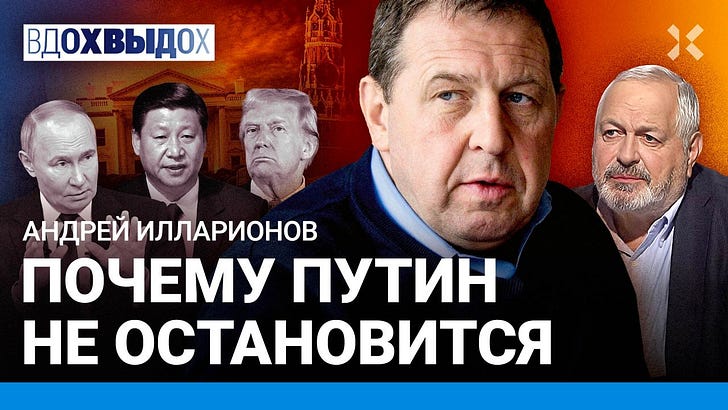Russian Strategic Calculations and Negotiation Posturing in the War on Ukraine
Putin will not negotiate until he faces defeat on the battlefield or achieves his grand ambitions to conquer central Europe
1. Overview
This report provides an analysis of the current strategic posture of Russian leadership, particularly that of President Vladimir Putin, in the context of the ongoing war in Ukraine based on the January 31 2025 interview of Andrei Illarionov, Putin’s former senior policy advisor. The report outlines the rationale behind Russia’s refusal to negotiate in good faith at this stage, Russia’s broader geopolitical objectives that cannot be decoupled from Ukraine, and the dire implications for European security if we fail to confront Russia.
2. Historical Context and Recurrent Rhetoric
2.1 The “Time for Negotiations Has Not Yet Come” Paradigm
2008 Context:
In August 2008, during escalating tensions in South Ossetia, Georgian President Mikheil Saakashvili contacted the Kremlin seeking intervention to halt provocations—including the shelling of villages and the killing of civilians and peacekeepers.
The response, delivered in a terse and unyielding manner, stated: “The time for negotiations has not yet come.”
This response coincided with an intensification of Russian military provocations, a precursor to the Russo-Georgian war.
2025 Application:
In the current Ukrainian conflict, a similar rationale is being employed. Ukrainian President Volodymyr Zelensky, along with U.S. President Donald Trump (who has recently taken a proactive stance on de-escalation), have signaled a willingness to pursue negotiations.
In contrast, Russian leadership continues to dismiss negotiation overtures, maintaining that the conditions are not yet ripe for a diplomatic resolution.
3. Analysis of Russian Strategic Rationale
3.1 Confidence in Military Superiority
Battlefield Dynamics:
Russian forces are observed to be steadily gaining ground in Ukraine, with the front line shifting in favor of Russia.
Russia has maintained the initiative on the battlefield for over a year and a half, indicating sustained operational momentum despite significant costs.
Material and Tactical Advantages:
Comparative assessments reveal a significant numerical superiority in terms of troop deployments, military equipment, and ammunition supplies.
Russian missile production is reportedly ten times higher than that of Ukraine, the United States, and NATO collectively, with projections of a 30% increase in production capacity over the next year.
3.2 Negotiation Stance and Tactical Delay
Public Dismissals:
Russian leadership has publicly dismissed negotiations by questioning the legitimacy and leadership of Ukrainian president Zelensky and his team.
Putin argues that his demands, which he made public in June of the previous year, were ignored.
Putin appears to be stalling for time by citing non-existent restrictions, expecting the United States and Ukraine to eventually submit to his demands.
Preference for Bilateral Engagements:
Putin wants bilateral discussions with U.S. leadership—most notably with President Trump—without involving Ukraine at the table.
The focus of these discussions will center on broader strategic issues, including the concept of “strategic stability” and the redefinition of spheres of influence in Europe, with the goal of ousting the United States out of Europe so that Russia could fill that vacuum.
4. Broader Geopolitical Objectives
4.1 Redefining European Influence
Strategic Ambitions:
Beyond the immediate military objectives, Putin is leveraging the invasion of Ukraine as an instrument to compel the takeover of the European security order by Russia.
Putin’s publicly stated aim is to alter the existing demarcation line (as established in 1997) and oust U.S. influence from Europe.
Imperial and Revanchist Ideologies:
Putin wants to reassert Russian control over regions including Ukraine, Georgia, Moldova, Belarus, the Baltic states, and the whole of central Europe.
This ideological framework supports the view that achieving these long-standing geopolitical goals justifies the continuation of current military operations in Ukraine.
4.2 The “War Against the West” Narrative
Historical Parallels:
Recollections from a 2008 meeting between Saakashvili and Putin reveal that Russian military actions were framed by Putin as being directed against Western interests rather than against individual states.
A similar narrative is emerging in Ukraine, where the suffering of Ukrainian civilians is portrayed as collateral to a broader struggle against Western encroachment.
Long-Term Objectives:
For Russian leadership, the invasion of Ukraine is just one of the first steps to correct the perceived geopolitical errors of 1991 (the collapse of the Soviet Union) and to reestablish a sphere of influence in Europe.
Securing these objectives is considered critical; a premature cessation of hostilities without achieving strategic goals would be viewed as a defeat within the domestic political milieu.
5. Implications for European and Global Security
Short-Term Conflict Dynamics:
The current posture suggests that Russia is unlikely to initiate negotiations while it maintains a significant military advantage.
Continued military engagement will continue, with Russian operational momentum providing a basis for further territorial and strategic gains.
Long-Term Geopolitical Reordering:
The broader ambition to reshape European security and diminish U.S. influence presents a substantial risk of long-term instability in the region.
The reliance on the “strategic stability” framework and the push for redefining influence boundaries may provoke a recalibration of NATO’s posture and force structure in Europe.
Diplomatic Challenges:
While Zelensky and Trump have signaled a desire to negotiate, the strategic calculus on the Russian side—grounded in military superiority in Ukraine and long-term geopolitical aims—suggests that any diplomatic breakthrough is contingent on a significant shift in battlefield dynamics.
6. Conclusion
Russian leadership, under President Putin, is deliberately postponing negotiations in the ongoing war with Ukraine. This stance is underpinned by a strong belief in military superiority, a broader strategic objective to take control over central Europe, and an ideological commitment to reestablish the Russian empire. As long as the Russian military maintains its operational advantage, and the broader geopolitical objectives remain unfulfilled, Russia will continue to deflect negotiation efforts, favoring a prolonged conflict that serves its long-term strategic interests.
Overall, Illarionov’s January 31st analysis is very much inline with the roadmap to negotiations we published on January 22nd.
The complete interview in Russian is available here:




